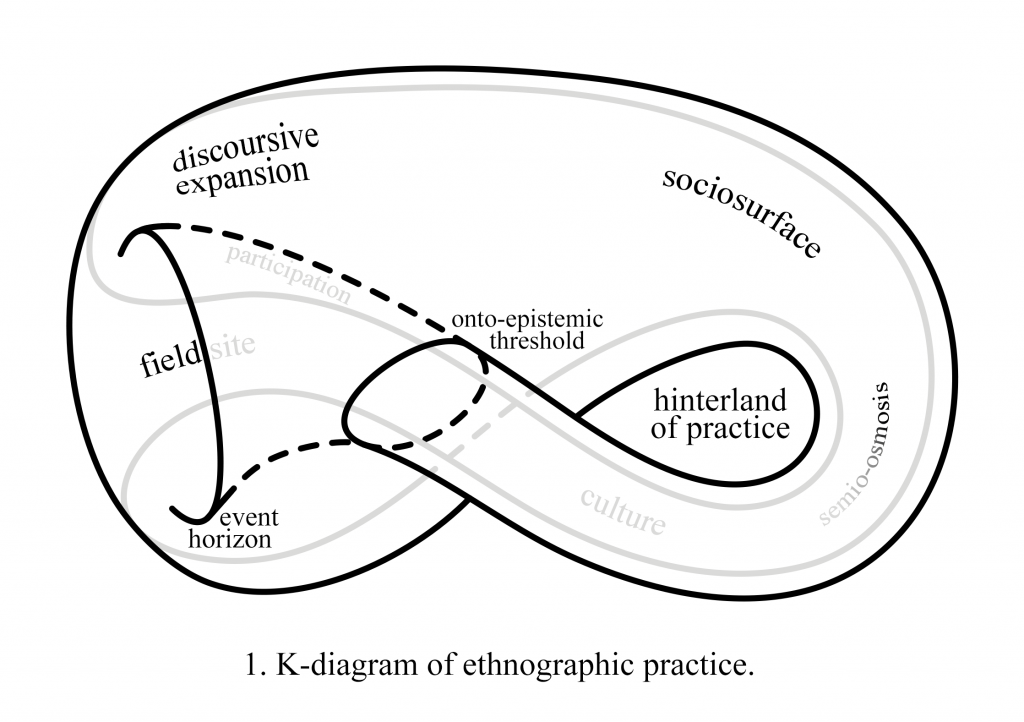Experimental Ethnography: 31 Prompts

➰ Not all experimentation is ethnographic. Not all ethnography is experimental. The intersection of ethnography and experimentation collapses into a black hole with a fluctuating event horizon, swallowing both researcher and informants, raw data and research outputs. Once you find yourself trapped in its gravity well, memento extendi – remember to stretch as a strand of infinitely spaghettified matter.
➰ The term ‘experimental’ is here deployed in parallel with experimental art, experimental cinema, experimental literature, experimental music, experimental poetry and experimental theater, and is orthogonal to scientific experimentation. Concern yourself with the processual articulation of doing rather than with the empirical demonstration of theories.
➰ Experimental ethnography asks: “what also could ethnography be?”. Answer this question through practice.
➰ Experimentation indexes an act with unknown outcomes rather than empirical truth-making. Evade the formulation of research plans and expected results; collapse the distinction between research design and creative process until any speculative proposal becomes a practical beginning.
➰ Camouflaged behind a four-field ontology of structural, poststructural, destructural and constructural theories, experimental ethnography disappears into infrastructural interstices. Rely on its hidden dimensionalities, its base materialism, its diminutive apprehensions, its cunning affordances.
➰ Experimental ethnography is neither before, nor after, nor against method. If methodology is a travel guide to research methods, experimental ethnography is aimless wandering in the hinterland of practice. Feel free to find shelter in case of epistemological precipitations.
➰ Resist the disciplinary injunction to reveal and excuse your research methods. Justify your methodology through provocation, sneak back epistemological conclusions from the backdoor of experience.
➰ Fail.
➰ Experimental ethnography does not necessarily rely on the freedoms of improvisational research. Give yourself restrictions, then double them. Try to avoid indulging in the self-congratulatory pleasures of deep hanging out until you understand their local value.
➰ There is no ethnos. You already belong to whatever tribe of unknowing experimental ethnographers your research proposal pulls together.
➰ Everything is –graphy: your writing has no exclusive grip on a world of symmetrical semiosis. Train your writing to wrap around other inscriptions.
➰ Escape your fieldsite. Once you get used to escaping, force yourself back into a fieldsite one scale smaller than the one you escaped from.
➰ The normative practice of participation presupposes a clear division between insideness and outsideness. Occupy instead a membranous position, inevitably trapped in-between belongings, a thin filtering device trained in semiotic osmosis.
➰ You’re most likely a kind and respectful ethnographer. Be as unethical as you can for an entire day, and accept all consequences of your actions. Re-evaluate your ethics in light of this.
➰ Not everything consents, responds and informs. Embrace unresponsiveness, rejection and foreclosure as valuable forms of communication.
➰ Gift your authorial privilege to informants. Protect your authorial labor from more privileged informers.
➰ Lie.
➰ No matter how experimental, ethnography is always an enfolding of experience and representation. Invent new forms of recording, new writing machines, new representational genres, new ways of encoding and decoding.
➰ Ethnography is co-extensive with mediation. Flatten sprawling networks of media when they become self-explanatory, extricate sealed mystiques of immediacy when they become self-justifiying.
➰ Situating is a transitive action – don’t just account for situated knowledges and practices, but acknowledge and practice situations.
➰ Mix your metaphors to see if they revert into equivalences or create irreducibility: What if your research subject was your audience, your ethics were your fieldsite, your material culture was your epistemology, your ontology was your alma mater, your conclusions were your beliefs?
➰ Indulge in fractal self-reflexivity: take a fieldnote about taking a fieldnote about taking a fieldnote about taking a fieldnote about itself. Then trash it, and feel alright about it.
➰ When you feel contented with your self-reflexive insights, let someone else audit your confessions and consign them to irrelevance. Take in all embarrassment without pride.
➰ Experimental ethnography isn’t merely a cosmetic replacement of ethnographic work with artistic practice. Use one to unbalance the other until their disorderly stacking becomes a canon, then move on to other representational domains.
➰ Critique collaboration as your worst enemy. Offer instead delaboration as a pragmatic counter to the exploitation of inclusivity.
➰ Cry.
➰ Leave autoethnography alone and let it live up to its name: the only research method that can write about itself. It doesn’t need you.
➰ Since all ethnography is already sensory, challenge yourself to experiment with the selective withdrawal of senses and the composition of skewed sensoria.
➰ Collect all the descriptors that have ever been used before “ethnography” to brand its disciplinary variants, then try to focus on something that wouldn’t fall under the purview of any of them.
➰ Resist the temptation of wallowing in the eternal postponing of conclusions. End projects when they seem to finally have some promise. There’s no “ongoing” in ethnographic experimentation.
➰ As any other kind of experimental practice, experimental ethnography has an expiration date: the time of its own becoming tradition. Be aware that each attempt at theorizing it brings it closer to its end.
